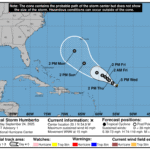Shirley Phinzee blinked wearily under the fluorescent lights of a Miami Wendy’s. She had slept in her car the night before, as she has nearly every night since January.
Phinzee is 63 and, for the first time in her life, homeless. That’s despite having a full-time job. She works 40 hours a week for $16 an hour — $3 more than Florida’s minimum wage — as a unionized janitor.
Phinzee, like more than half of Miami-Dade residents, is what United Way considers ALICE — asset-limited, income constrained, employed. They’re people who work, often earning too much to qualify for state assistance, but effectively live paycheck to paycheck.
There are 527,469 such households in the county, United Way Miami found in a recent report. That’s 54% of Miami-Dade households — a 40,000-household increase since 2023 — and the highest rate of Florida’s larger metropolitan areas.
In the Sunshine State more broadly, 47% of households are financially pressured, according to United Way. In only three states — Louisiana, Mississippi and New York — are greater percentages of residents under more economic strain.
Though lower than a 2014 peak, when 60% of local families didn’t earn enough to make ends meet, Miami-Dade’s ALICE population has crept up since the pandemic, when a surge of higher-earning, out-of-state residents moved to South Florida, driving up local costs, especially for housing. Local wages, however, haven’t kept pace, pushing more and more households toward the financial brink.
“These are child care workers. These are health aides. These are folks who may serve you a drink or a meal at a restaurant,” said Symeria Hudson, CEO of United Way Miami. “They keep the city going.”
And yet, many of those workers are fighting just to stay above water. They might have to choose between food and child care or car insurance and a medical procedure. Many are just a crisis or two away from financial ruin.
By MAX KLAVER/Miami Herald



